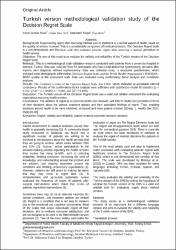| dc.contributor.author | Telatar, Tahsin Gökhan | |
| dc.contributor.author | Özel, Canan Satır | |
| dc.contributor.author | Turgut, Abdulkadir | |
| dc.contributor.author | Kinli, Özge | |
| dc.date.accessioned | 2022-10-04T13:30:02Z | |
| dc.date.available | 2022-10-04T13:30:02Z | |
| dc.date.issued | 2021 | en_US |
| dc.identifier.citation | Telatar, T.G., Ozel, C.S., Turgut, A. & Kinli, O. (2021). Turkish version methodological validation study of the Decision Regret Scale. Ethiopian Journal of Health Development, 35(4). | en_US |
| dc.identifier.issn | 1021-6790 | |
| dc.identifier.uri | https://hdl.handle.net/11436/6649 | |
| dc.description.abstract | Background: Experiencing regret after receiving medical care or treatment is a normal aspect of health, based on the quality of service received. This is a considerable component of medical decisions. The Decision Regret Scale is a one-dimensional and five-item scale that evaluates patients' regret after receiving a medical procedure or health service.
Objective: The aim of this study is to evaluate the validity and reliability of the Turkish version of the Decision Regret Scale.
Methods: This is a methodological scale validation research conducted with patients from a university hospital in Istanbul, Turkey. Data was collected from 53 participants who had a total abdominal hysterectomy operation after myoma uteri diagnosis without oophorectomy. Data was collected using a structured questionnaire, which included socio-demographic information, Decision Regret Scale, and the World Health Organization's WHOQOL-BREF quality of life assessment scale. Data was evaluated using confirmatory factor analysis and correlation analyses.
Results: The Cronbach alpha value of the Decision Regret Scale was 0.868, which indicated an acceptable internal consistency. Results of the confirmatory factor analysis were sufficient with satisfactory model fit statistics (p = 0.282, chi 2/clf = 1.3, RMSEA = 0.069, and GFI = 0.943).
Discussion: The Turkish version of the Decision Regret Scale was a valid and reliable instrument for evaluating regret about receiving health services.
Conclusions: The addition of regret as an outcome health care received will inform health care providers in terms of their decisions about the various treatment options and their associated feelings of regret. Thus, enabling decisions around health to be more informed, structured and more patient oriented. | en_US |
| dc.language.iso | eng | en_US |
| dc.publisher | Addis Ababa University | en_US |
| dc.rights | info:eu-repo/semantics/openAccess | en_US |
| dc.subject | Regret | en_US |
| dc.subject | Validity and reliability | en_US |
| dc.subject | Patient centered outcomes research | en_US |
| dc.subject | Decision | en_US |
| dc.title | Turkish version methodological validation study of the Decision Regret Scale | en_US |
| dc.type | article | en_US |
| dc.contributor.department | RTEÜ, Tıp Fakültesi, Dahili Tıp Bilimleri Bölümü | en_US |
| dc.contributor.institutionauthor | Telatar, Tahsin Gökhan | |
| dc.identifier.volume | 35 | en_US |
| dc.identifier.issue | 4 | en_US |
| dc.relation.journal | Ethiopian Journal of Health Development | en_US |
| dc.relation.publicationcategory | Makale - Uluslararası Hakemli Dergi - Kurum Öğretim Elemanı | en_US |


















